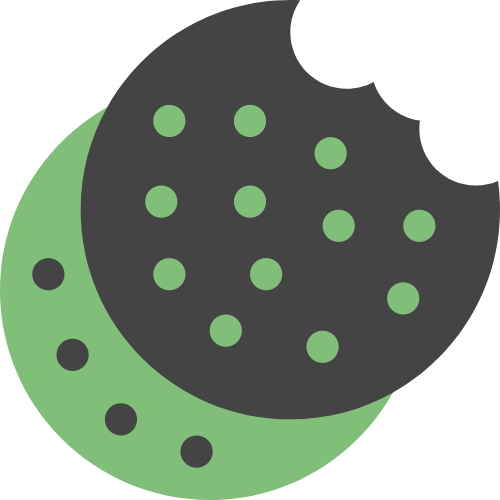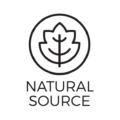Welcome to MILESTONE® FAQ Center
What can we help you find?
We answer your most frequently asked questions on functional foods over the past ten years. Discover our functional formulas now, and learn how we have managed to produce some of the best functional foods in the world with natural ingredients and an incredible taste.
Vegan Functional Foods
What are functional foods and why they are important for me?
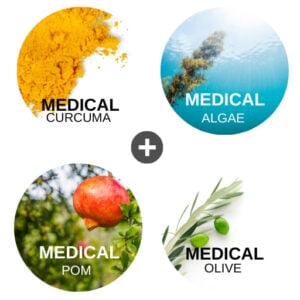 Functional foods are a new category of foods with certified health benefits and much higher bioavailability rates than most dietary supplements. They are foods that will have a positive effect on your health beyond basic nutrition. Clinical evidence suggests that functional foods may reduce your risk of developing chronic diseases and that vitamins, minerals, and antioxidants should better be received from foods rather than supplements.
Functional foods are a new category of foods with certified health benefits and much higher bioavailability rates than most dietary supplements. They are foods that will have a positive effect on your health beyond basic nutrition. Clinical evidence suggests that functional foods may reduce your risk of developing chronic diseases and that vitamins, minerals, and antioxidants should better be received from foods rather than supplements.
Can functional foods be whole foods?
It is very rare that common whole foods truly are foods with the capacity to regulate certain functions in our body, i.e. definition of functional foods. It requires scientific intelligence (i.e. deep knowledge of the complex food matrix and how it is being affected by changes in processing parameters) to turn a common food into a functional food. To achieve this healing level, functional foods are required to carry vitamins, minerals and/or phenolic compounds at levels that make an impact. Although some foods perform really high on this scale, it is still very difficult to rank them as functional, if not further optimized. Among those exemplary foods are: garlic, algae, curcumin, brocolli and olive oil.
Can Omega-3 only be obtained from fish?
We thought so for many years, but now this myth is over. The most effective and sustainable solution is algae. The health benefits associated with the consumption of algae are numerous and superior to those of fish. The advantages of long-chain omega-3 fatty acids, particularly DHA and EPA, were first discovered by scientists and researchers in the field of food science and technology in the 1970s while researching the Greenland Inuit, who consumed large amounts of fats, primarily from fish, but showed few symptoms of cardiovascular heart disease.
What is the difference between our functional foods, common foods and supplements?
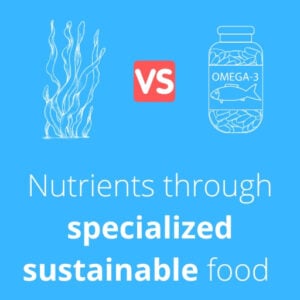 They are neither drugs nor supplements. Nutrients from functional foods are combined in a specific way and perform synergistically in that “format”, containing a number of unique bioactive compounds, enzymes, polyphenols, activators, nutritive compounds and more that cannot be found in drugs or supplements. This unique complex is scientifically called the complex food matrix.
They are neither drugs nor supplements. Nutrients from functional foods are combined in a specific way and perform synergistically in that “format”, containing a number of unique bioactive compounds, enzymes, polyphenols, activators, nutritive compounds and more that cannot be found in drugs or supplements. This unique complex is scientifically called the complex food matrix.
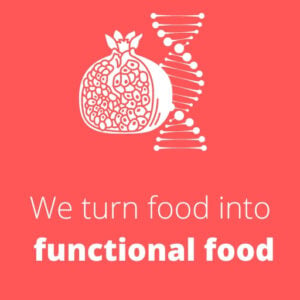
How will functional foods work in my body?
 Nutrients from our functional foods are not isolated components, but rather biochemical systems composed of several linked substances that work synergistically to fulfill and regulate many different functions and processes in the body. They possess cardioprotective, neuroprotective, anti-oxidant, anti-inflammatory, and hormonal balancing properties.
Nutrients from our functional foods are not isolated components, but rather biochemical systems composed of several linked substances that work synergistically to fulfill and regulate many different functions and processes in the body. They possess cardioprotective, neuroprotective, anti-oxidant, anti-inflammatory, and hormonal balancing properties.
How may I benefit from consuming functional foods daily?

- In a nutshell, everyone with different dietary needs and health goals.
- Kids and toddlers: overall mental and physical development. Keeps them strong and active.
- Pre/post-natal nutrition
- People managing various acute and chronic health conditions.
- People undergoing various medical treatments, pre/post-surgery recovery.
- People seeking to manage anti-oxidative stress and reverse signs of aging.
- The elderly who are facing degenerative diseases, e.g. mild cognitive impairments (Alzheimer's, Parkinsons disease), osteoporosis, arthritis, and many similar conditions.
What is so unique about our vegan functional foods?
- We apply a unique set of proprietary protocols in the field that gives rise to very high amounts of vital nutrients and bioactive compounds before processing. Our functional foods are free of any chemical contaminants or microplastics that may harm you.
- We then very gently process these highly nutritious fruits in order to preserve their health properties in liquid form via innovative processing practices. Our innovation comes at all stages, ensuring zero oxygen conditions during processing, optimum time and temperature control.
- We design unique liquid functional foods formulas in view of increasing their bioabsorption and bioavailability in the body.
- We are committed to offering you functional nutrition products that can truly change your life.
- We innovate at all stages from soil to the final drop. Discover more about us, what makes us happy and proud.

Functional foods go much beyond basic nutrition. We currently hold health claims certificates for all our products, as dictated by European Food & Drug Administration Authority. Practically this means that they have the capacity to rejuvenate and provide the healing capability to the body with numerous medicinal benefits. Our functional foods have always been at the center of numerous clinical studies and trials conducted by some of the most prestigious Institutions globally.
What are examples of functional foods?
- High phenolic olive oil
- Extracts & concentrates, e.g. garlic extract, pomegranate concentrate
- Broccoli
- Algae
- Wild greens
- Seeds, such as chia or pomegranate seeds
- Green tea
- Curcumin
High Phenolic Olive Oil
Why consume a spoonful of high phenolic olive oil every morning?
High phenolic olive oil is a new category of olive oil with certified health benefits. According to European Food Safety Authority (EU REG 432/2012) an olive oil containing more than 250mg/kg of phenols protects the blood lipids from oxidative stress. Ideal for:
- Food for Kids
- Food for High Blood Pressure
- Food for Cholesterol
- Food for Diabetes
- Food for Brain
- Food for Vegans
Does high-phenolic olive oil has any side effects?
The consumption of high phenolic olive oil does not have any side effects and does not seem to interfere with any prescribed medication
What is the recommended dosage?
High Phenolic Olive Oil: receive orally 10ml every morning on empty stomach.
Is olive oil a functional food?
Common olive oil is not a functional food but a highly nutritious food. It is prevented from being widely accepted as a functional food, and the reason is two fold. First, the cultivation practices and second the processing sensitivity. In contrast, high phenolic olive oil is the best example of a natural functional food produced with scientific intelligence in order to break this barrier. In terms of the experienced health benefits, it is capable of regulating high cholesterol, and blood sugar levels, among other health benefits, within a relatively short period of consumption, i.e. less than 12-16 weeks.
Which olive oil has the highest level of polyphenols?
When choosing your olive oil, the highest level of polyphenols should not be your primary concern. The beneficial effect may be obtained with the consumption of 20ml of an olive oil containing a total of 250mg/kg polyphenols. An olive oil carrying above 750mg/kg is considered by scientists to be a medical-grade olive oil. It typically contains a high level of oleuropein, hydroxytyrosol, and their derivatives; and it only takes 10ml for the beneficial effect to take place. These compounds are powerful antioxidants displaying anti-oxidant, anti-angiogenic and anti-inflammatory properties. Another point to watch out for is chemical free or organic products, which practically means that you won't be consuming any chemical compounds that may cause oxidative damage. An organic high phenolic olive oil is the true definition of functional foods.
Medical Algae
Why choose our functional algae oil over fish oil?
There is a plethora of scientific evidence showing that food for omega-3 from algae is much more effective than fish oil in absorbing EPA, DHA, and ALA, while offering great advantages to preserving our planet’s natural resources by avoiding overfishing. 62% of consumers would prefer algae-based omega-3.
What algae is used for medicine?
Protein, B vitamins, and iron are all found in blue-green algae, which is used as a food source. Moreover, they are used to treat premenstrual syndrome (PMS), hay fever, diabetes, stress, exhaustion, anxiety, and other women's health problems in addition to weight reduction and attention deficit-hyperactivity disorder./p>
What are the medical benefits of algae?
Blue-green algae is used by some people to strengthen their immune systems, enhance their memory, increase their energy and metabolism, improve their ability to exercise, lower their cholesterol, avoid heart disease, heal wounds, and improve their digestion and bowel habits.
Is algae the healthiest food?
High concentrations of potassium, selenium, magnesium, calcium, iron, and vitamins A, C, and K can be found in algae. The nutrient iodine, which is largely absent from other foods and is necessary for a healthily functioning thyroid gland, is one of its greatest natural sources. If you want to avoid iodine, and any potential chemical contamints, you may as well look into medical algae grown under a controlled fermentation environment.
Is algae good for your immune system?
The immune system has recently been found to be stimulated by a variety of microalgal chemicals in both human and mouse models (e.g., by altering macrophage activation and the production of pro- and anti-inflammatory mediators), making them possible treatments for human illnesses.
Is algae good for your brain?
In fact, peer-reviewed studies have shown that algae may improve a variety of bodily functions that promote both general well-being and brain function, including mental acuity, short- and long-term memory, and problem-solving skills.
Pomegranate Concentrate
What are the benefits of eating pomegranate?
Pomegranate is one of nature's most anti-oxidant fruits. They're rich in fiber, vitamins, and minerals and even contain some protein. A range of extremely healthy bioactive compounds, unrivaled by other foods may also be found in pomegranates. Studies have shown that they may have several benefits for your body, including lowering the risk of various diseases. MILESTONE® Pomegranate Concentrate is one of the most anti-oxidant concentrates ever to be recorded, very rich in calcium, potassium, iron and polyphenols. Ideal:
Does the pomegranate concentrate has any side effects?
Consult your doctor before consuming this product, especially if you are under medical supervision or how to use it during pregnancy.
What is the recommended dosage?
Pomegranate Concentrate: receive orally 10ml daily. You may dilute it in your juice or smoothie.
Is the pomegranate good for skin?
Pomegranate's antibacterial properties are one of its skin benefits. This deals with and treats acne, prevents new outbreaks, lessens scarring, and calms irritations. It also regulates and balances the oil production on your skin.
Is the pomegranate good for weight loss?
Don't let the fact that pomegranates have 14g of sugar per 100g deter you too much. In addition, 100g of pomegranates provide 30% of the daily recommended value for vitamin C, 7g of fiber, and 3g of protein.
Is pomegranate the healthiest fruit in the world?
The majority of people, regardless of age, simply love pomegranates, one of the world's most sought out fruits. It has various chemicals that are unequaled by any other fruit and is regarded as one of the healthiest fruits in the world.
Curcumin Extract
What makes our functional curcumin so unique?
Our curcumin extract is 185 times more bioavailable than anything out there. Its high bioavailability ensures that it will be absorbed into your body in as little as 66 minutes (versus up to 450 minutes for native curcumin) and will last as long as 24 hours (versus approximately 2 hours for native curcumin). It is confirmed by nutritional scientists based on 3 human clinical trials.
What foods are highest in curcumin?
Since turmeric is the main source of the polyphenol curcumin, it has drawn interest from both the medical and scientific communities as well as food enthusiasts. Turmeric has long been known for its medicinal benefits.
How can I get curcumin naturally?
We encourage you to use our exclusive curcumin extract in order to get the highest levels of curcumin that are synergistically combined with the enzyomes and polyphenols of our pomegranate concentrate. It is a functional food - not a supplement.
What foods decrease inflammation?
Anti-inflammatory foods
- Curcumin
- High phenolic olive oil
- Green leafy vegetables, such as spinach, and kale
- Nuts like almonds and walnuts
- Blueberries, cherries, and grapefruits
Who should not use curcumin?
Typically, it is advised against using a curcumin or turmeric supplement if you are on a blood-thinning medicine like warfarin, clopidogrel, or aspirin since it may increase the blood-thinning effects of the medication, possibly to dangerous levels.
What is the best way to absorb curcumin?
The greatest way to absorb curcumin is with meals. The greatest foods to pair with curcumin are those that are fatty, like our special high phenolic olive oil. This is due to the fact that they contain lecithin, a naturally occurring antioxidant that boosts metabolism, as well as carotene, polyphenols, important vitamins A, D, and K, and vitamin E. Lecithin aids in the body's absorption of turmeric.
Billing and Shipping
How can I check the status of my order?
Login and proceed to My Account tab, where you will be able to get track of your order.
How do I order?
What payment methods do you accept?
For international orders, we accept payment via bank transfer, PayPal, credit, or debit cards.
Where do you ship?
We ship to all major international destinations. Orders originating from Greece, Europe, Australia, Middle East, S. America, and the United States are handled by our warehouse in Greece, while the rest of Asia is currently being served by our warehouse in Singapore. Depending on the shipping location, your order may be subject to import taxes and other fees charged by the local customs authority and/or your preferred carrier.
What is your question on functional foods?
Do you have any additional questions that can help others make the right decision, and that you would like to see on this list? Feel free and send us an email via our contact form below. We will update our frequently asked questions on functional foods, including yours as well.
